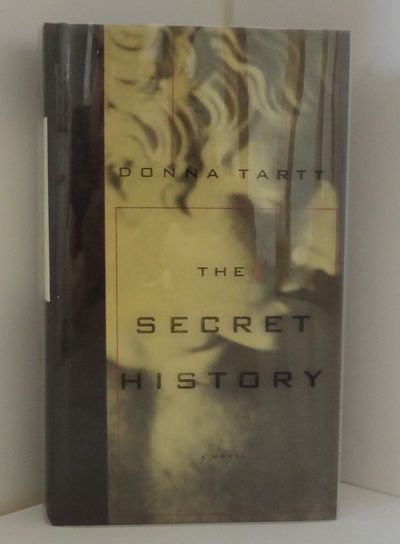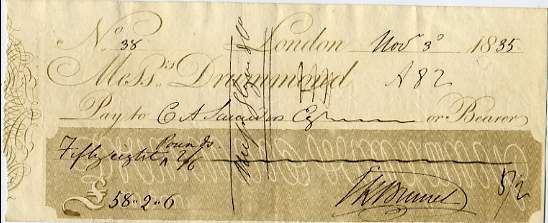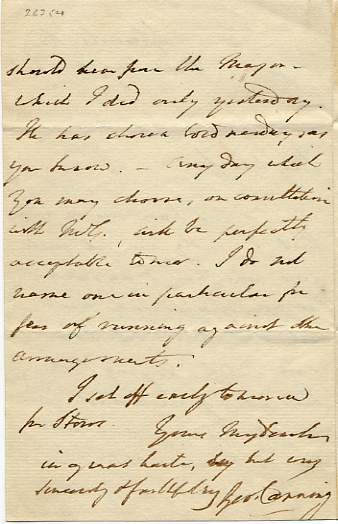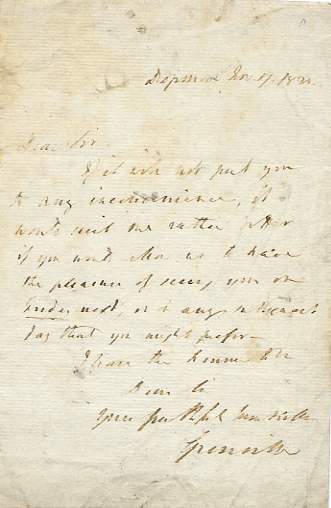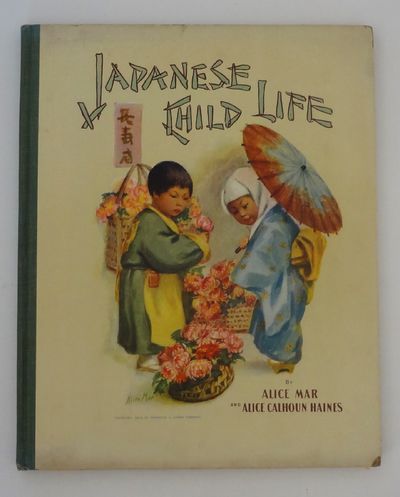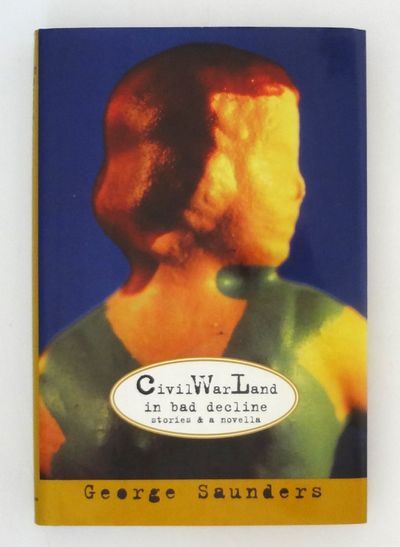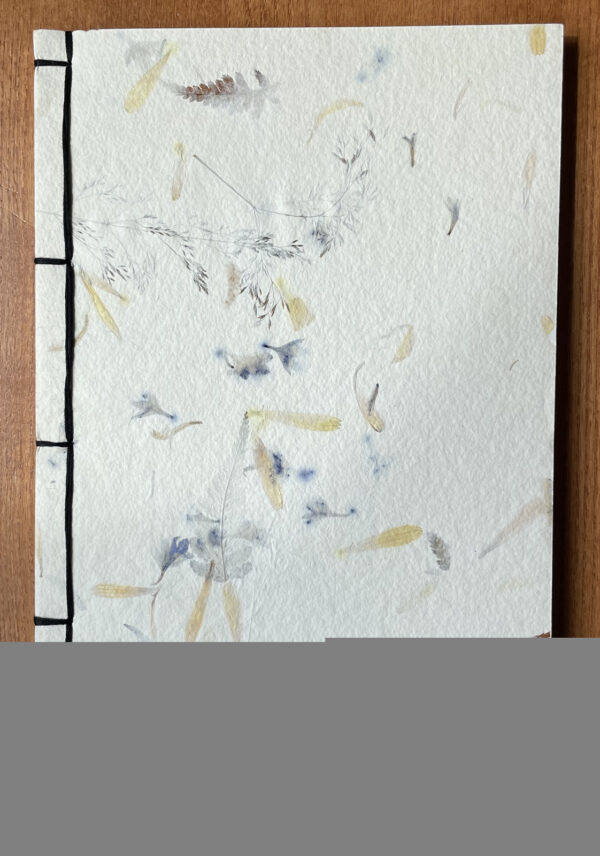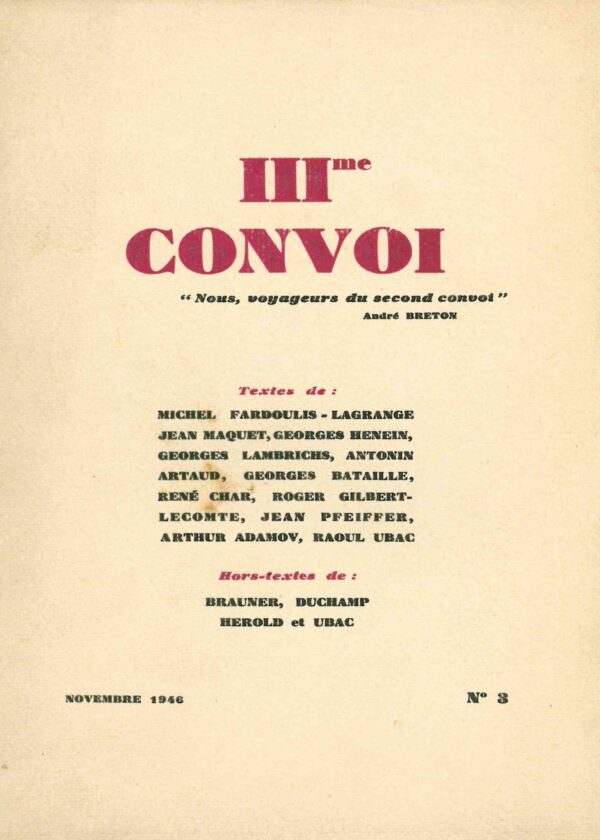
IIIme convoi / Troisième convoi. No. 1 (Octobre 1945) through No. 5 (1951) (all published)
Paris: 1945-1951. Octavos (19 x 12.7 to 21 x 14 cm). Original printed paper wrappers, housed in fitted archival slipcase; 16, 16, 40, 46, 30 pp. Some light toning, overall excellent. A rare complete collection in five fascicules of the Surrealist magazine under the editorial direction of French poet Michel Fardoulis-Lagrange. Cofounded with Jean Maquet, and with the collaboration of René de Solier and Raoul Ubac, five total issues were published. Speaking later on the spirit behind the journal, Fardoulis said "Nous avions fait une croix sur le sartrisme et le surréalisme, l'un pour sa conception de l'engagement, l'autre pour ses manifestations scandaleuses. Nous voulions nous situer ailleurs, dans le domaine de l'extériorité, c'est-à-dire dans le mythe du langage." He and Maquet chose the title after a famous line from André Breton, and meant to signify not a complete departure from Surrealism, but a slight shift in direction and approach. The issues contain brief works of prose and poetry with an occasional illustration, with contributions from Fardoulis, Maquet, de Solier, and Ubac, along with Francis Picabia, Louis Richet, Pierre Fallot, Georges Bataille, Marcel Lecomte, Georges Hénein, Georges Lambrichs, Antonin Artaud, René Char, Roger Gilbert-Lecomte, Jean Pfeiffer, Arthur Adamov, Raymond Michelet, Jean Grenier, Robert Cregut, Charles Cuits, and Yves Bonnefoy.- $2,500
- $2,500

L’Almanacco degli artisti “Il Vero Giotto” 1931
Roma/Foligno: Franco Campitelli, 1931. Duodecimo (19.2 x 13.2 cm). Original illustrated wrappers with cover illustration by Mario Mafai; (2), 432, (4) pp. Some signatures coming loose from binding, overall very good. A small Futurist Italian art almanac, conceived of and compiled by Carlo d'Aloisio da Vasto. This volume features a colver illustration by Mario Mafai and writings by Luciano Folgore, Corrado Pavolini, Luigi Bartolini, C. Govoni, Alfredo Casella, G.B. Angioletti, Alberto Sartoris, Massimo Bontempelli, Vincenzo Costantini, Gerardo Dottori, Anton Bragaglia, and others, as well as illustrations by numerous artists including Morandi, De Pisis, Carrà, Casorati, Soffici, Spadini, and A. Martini. Other volumes were published in 1930 and 1932, but as of October 2023, OCLC locates only 2 holdings of the 1931 almanac in North American libraries.- $150
- $150

Marinetti, “Animatore d’Italianità” (1924) (all published)
The single unique issue published of the special journal devoted to Marinetti, 4 pp., edited by Mino Somenzi, containing a "Manifesto per le Onoranze Nazionali a F.T. Marinetti", an homage to Marinetti by Marco Ramperti, poetry, and other articles with titles such as "Lo spirito profetico di Marinetti", "L'influenza mondiale di Marinetti e del Futurismo", and "Il significato del I Congresso futurista." Scattered illustrations. Some creasing, toning, small closed tears and edgewear. Elephant folio. Original self-wrpps. N.p. (Milan) (Cavenaghi & Pinell) n.d. (1924). Mino Somenzi was an early member of the Futurist movement. He founded and directed the Istituto Fascista di Propaganda Nazionale in Milan in 1923, and continued his involvement with Futurism after moving to Rome in 1926. In 1929, he was among the editors of the Manifesto dell'Aeropittura Futurista, along with Marinetti, Balla, Fortunato Depero, Gerardo Dottori, Fillia, and others. In May 1932 he founded the important journal "Futurismo", which became the official publication of the Futurist movement. In 1933 he organized the first national Futurist art exhibition at Piazza Adriana in Rome. As of January 2020, WorldCat locates only 4 holdings of this unique publication in North American libraries.- $2,250
- $2,250
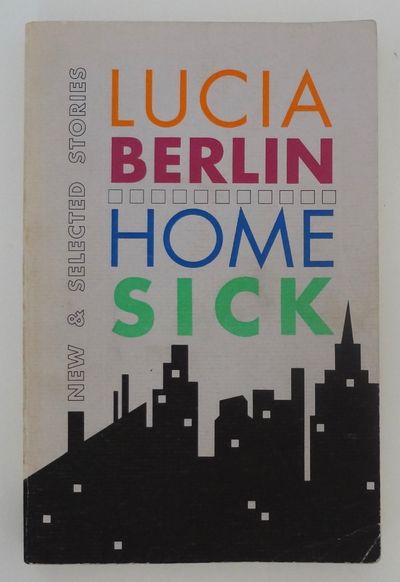
Homesick
Berlin, Lucia San Francisco, 1990 Soft cover. Octavo. SIGNED by author with a personal inscription to Keith Abbott. Fading to spine otherwise very good. Poet and author Keith Kumasen Abbott was a colleague of Berlin's at Naropa University where he taught writing and art. He is perhaps best remembered for his memoir of Richard Brautigan, with whom he was a friend.- $600
- $600
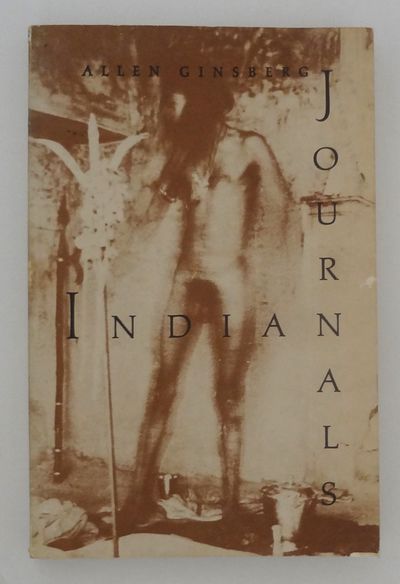
Indian Journals. March 1962 – May 1963
Ginsberg, Allen San Francisco, 1970 Soft cover. Octavo. 210pp. Signed, dated and inscribed on the title page to Keith Abbott 7/9/94 with pen sketches by Ginsberg. Very good Keith Abbott, was a professor at Naropa University's Jack Kerouac School of Disembodied Poetics, a published author and poet, and colleague of the author.- $200
- $200
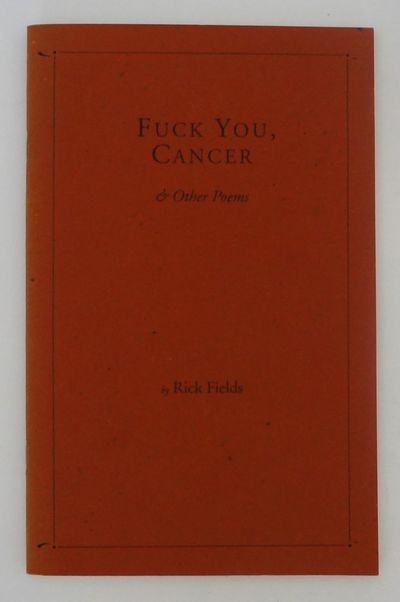
Fuck You, Cancer & Other Poems
Fields, Rick Berkeley, 1997 First Edition, one of 500 copies. Side stapled stiff wraps. Small octavo. 37 pages. SIGNED by author with a twelve line inscription to friend Sidney (Goldfarb) a fellow poet and colleague. Rick Fields was an accomplished author, poet and specialist in the history of Buddhism in the United States. This is a collection of poetry about his cancer, approached from a personal and Buddhist point of view.- $125
- $125
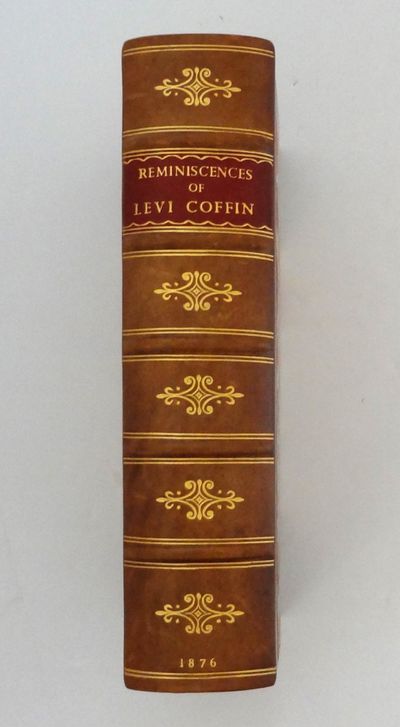
Reminiscences of Levi Coffin
Coffin, Levi London and Cincinnati, OH, 1876 Hard cover. Octavo.[viii] 712pages with two frontispiece portraits of Levi and Catherine Coffin. Beautifully rebound in half calf over marbled boards by Period Bookbinders Company, UK. A touch of foxing to frontispieces otherwise clean and unmarked throughout. "A brief History Of The Labors Of A Lifetime In Behalf Of The Slave, With The Stories Of Numerous Fugitives Who Gained Their Freedom Through His Instrumentality, And Many Other Incidents." Levi Coffin was an active leader of the Underground Railroad in Indiana and Ohio, some unofficially called Coffin the "President of the Underground Railroad," estimating that three thousand fugitive slaves passed through his care. The Coffin home in Fountain City, Wayne County, Indiana, is now a museum, sometimes called the Underground Railroad's "Grand Central Station." Howes B923.- $650
- $650
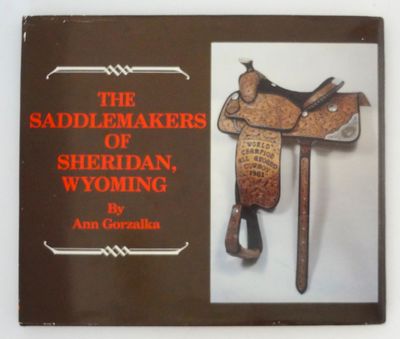
Saddlemakers of Sheridan County, Wyoming
Gorzalka, Ann Boulder, CO, 1984 First Edition, First Printing. Oblong hard cover. 91 pages. Pictorial dust jacket with closed tears to back otherwise very good. A tribute to the talented saddlemakers of Sheridan, Wyoming past and present. Artists in leather would be a most appropriate way to describe those individuals who create the beautiful trophy saddles seen in parades and often found in museums. - from the book.- $150
- $150
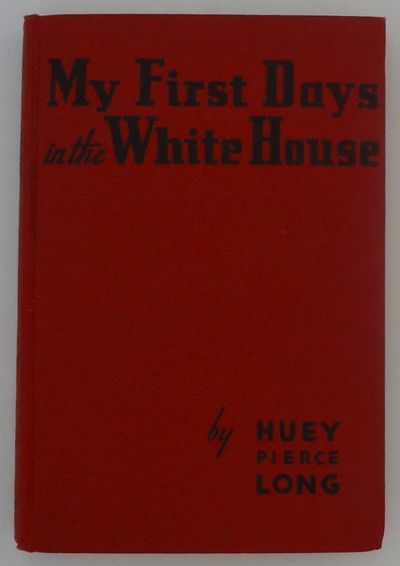
My First Days in the White House
Long, Huey Pierce Harrisburg, Pa, 1935 Hard cover. Octavo. [viii] 146pp. Textured red publisher's cloth with black titles. Illustrations by Cleanthe Carr. Very good. This book is often referred to as Long's "second autobiography" and was published after his assassination in 1935, it emphatically laid out his presidential ambitions for the election of 1936 and, through imaginary conversations, his first days of presidency.- $100
- $100
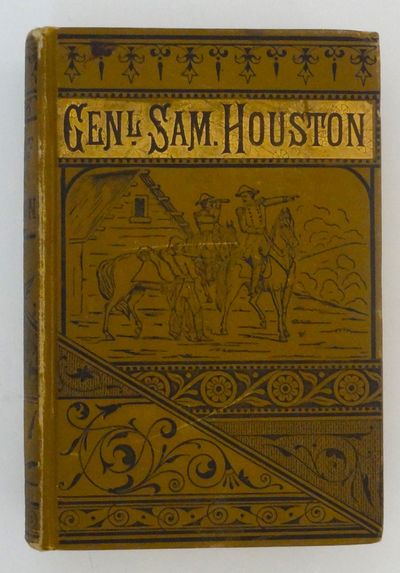
The Life of Sam Houston
Lester, Charles Edwards Philadelphia, 1867 Hard cover. Octavo. [xi] pp 13-402, (12). Mustard/green cloth stamped in black and gold. Frontispiece of Houston and five additional b/w plates. Howes 271 (iii). Samuel Houston was an American general and statesman who played a pivotal role in the Texas Revolution and served as the first and third president of the Republic of Texas. Charles Edwards Lester or C. Edwards Lester (1815–1890) was an American author, diplomat, Presbyterian Minister and Abolitionist who in 1840 addressed antislavery meetings in Massachusetts and was elected a delegate to the London antislavery conference of that year. - wikipedia- $125
- $125
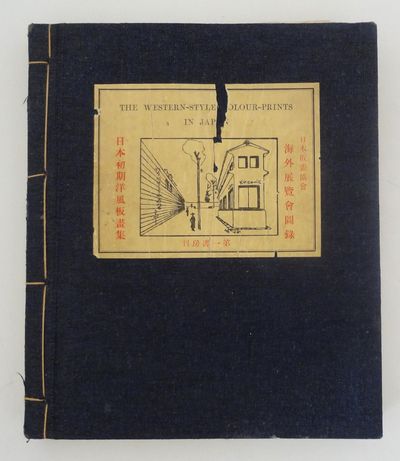
The Western Style Colour Prints in Japan
Toyama, Usaburo Tokyo, 1936 Blue cloth over limp boards, 9 1/4" by 7 3/4". 305 pp. Paper label to front cover has slight loss. Both free end papers creased otherwise very good. Starts with a preface by Yone Noguchi and a 27 page essay on "The Origin of the Western Style Landscape Painting in Japan" followed by "A Retrospective Catalogue of Western Style Colour Prints in Japan" comprising of a short biography of 42 Japanese artists and 255 b/w plates.- $150
- $150

Works of the Late Doctor Benjamin Franklin
Franklin, Benjamin Dublin, 1793 Octavo. 8" x 4 7/8" Contemporary full calf binding. [vi] (2) 303pp. Lacks frontispiece. Preface by Richard Price. Exterior hinges starting, covers show wear. Text block very good. Ford (Franklin Bibliography) C.439.- $950
- $950
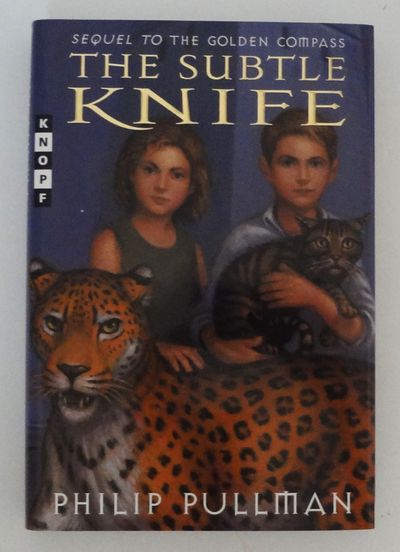
The Subtle Knife
Pullman, Philip New York, 1997 First American Edition, First Printing. SIGNED by author in blue ink on title page. Clean and unmarked with a very tight binding. Minimal shelf wear to intact dust jacket. Second book in the author's highly acclaimed "His Dark Materials" trilogy.- $125
- $125
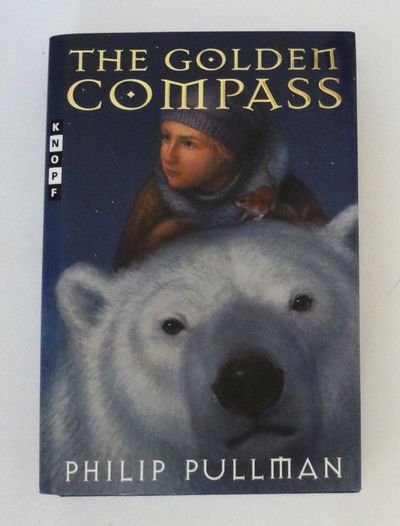
The Golden Compass
Pullman, Philip New York, 1996 First U.S. Edition, Second Printing. Inscribed and SIGNED by author in blue ink on title page "For Judith, with / my best wishes- / Philip Pullman" Hard cover. Clean and unmarked with a very tight binding. Minimal shelf wear to intact dust jacket. First book in the author's highly acclaimed "His Dark Materials" trilogy.- $175
- $175
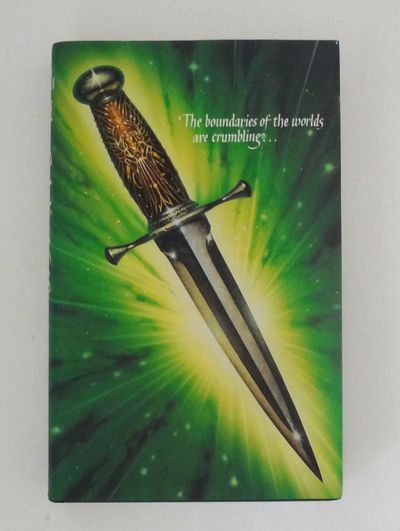
The Subtle Knife
Pullman, Philip London, 1997 First Edition, First Printing. Hard cover. Octavo. Inscribed and SIGNED by author in blue ink on title page "Best wishes to J----- V--- / Philip Pullman" Hard cover. Clean and unmarked with a very tight binding. Minimal shelf wear to intact dust jacket. Second volume in the highly acclaimed "His Dark Materials" trilogy.- $220
- $220
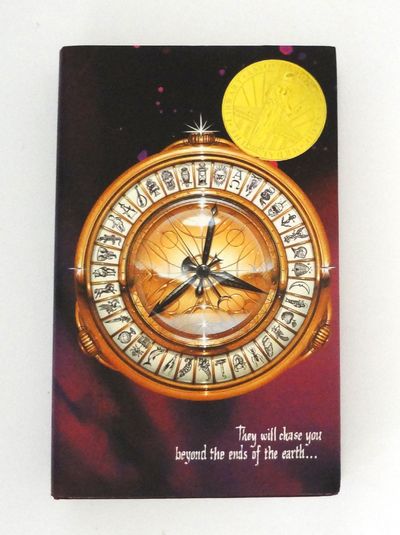
Northern Lights
Pullman, Philip London, 1995 First edition, third printing. Hard cover. Octavo. Inscribed and SIGNED by author on title page in blue ink "My greetings to J----- V--- / Philip Pullman" Clean and unmarked with a very tight binding. Carnegie Medal sticker to front of dust jacket which shows minor shelf wear and is intact. In this, the first book in his compelling "His Dark Materials" trilogy, Philip Pullman has created a powerfully original universe, remarkable for its combination of electrifying action and heart-stopping emotion. - from the dust flap.- $375
- $375
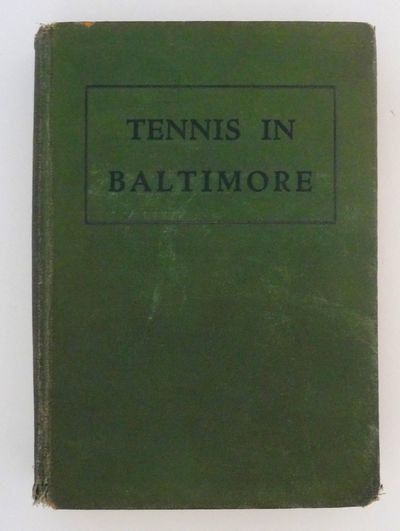
Tennis In Baltimore
Roberts, Frank G. Baltimore, MD, 1928 Hard cover. Octavo 241 pages plus seven photographic illustrations. Green cloth over boards with black lettering. Interesting ink stamp to front free end paper dated 1933 and referring to the National Industrial Recovery Act, from the Cragin Simplex Corp. maker of tennis rackets. Cover shows some shelf wear with slight fading to spine. The story of tennis in Baltimore from 1879 onwards and containing a 29 quatrain "Tennis Player's Rubaiyat" reportedly written in the 1890s.- $150
- $150
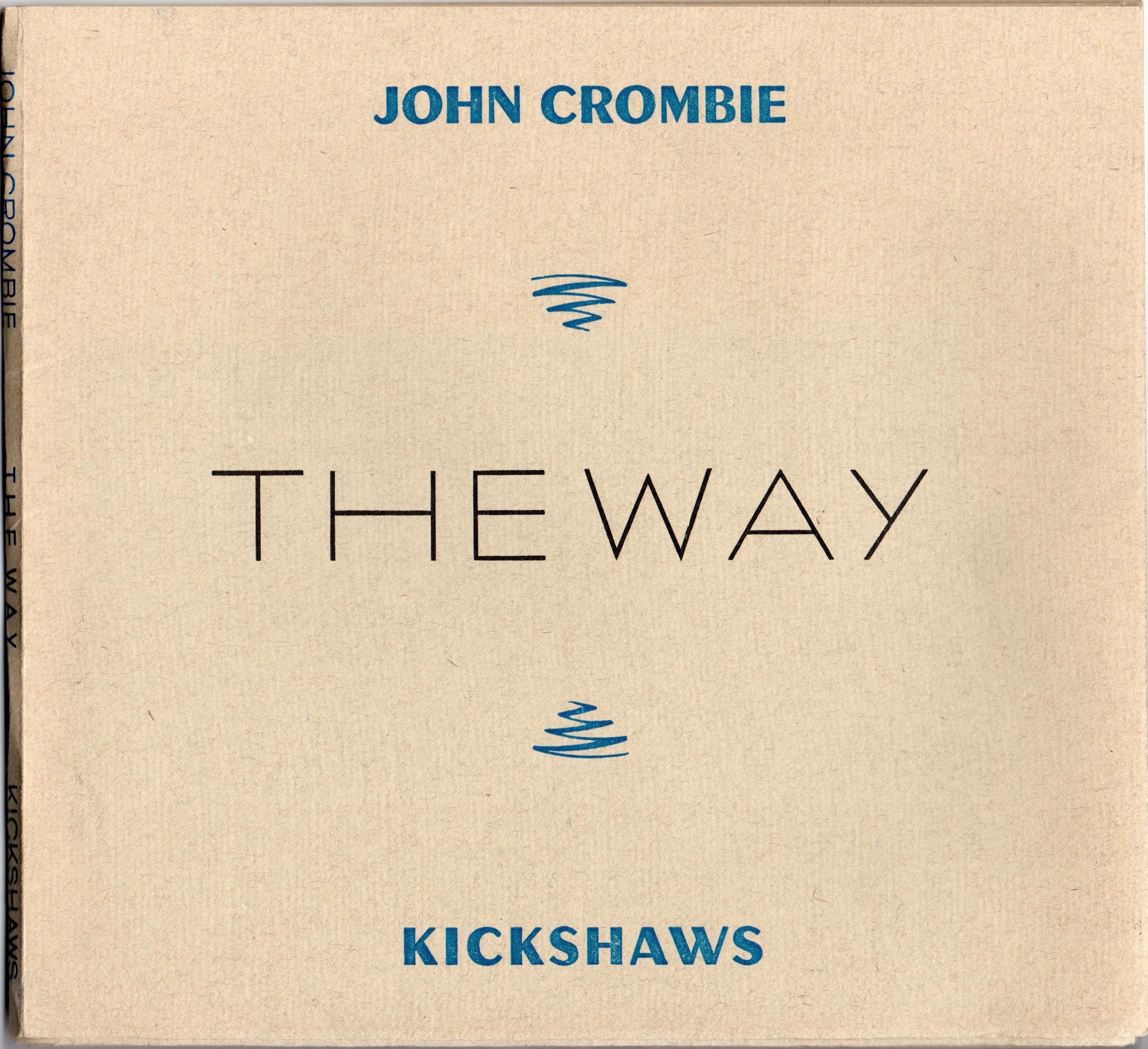
This is the Way. With yet further apologies to T.S. Eliot (and some to Billy Wilder).
John CROMBIE 1 volume (205 X 190mm.] Non paginée, sous couverture papier imprimée. Livre d'artiste et typographique, publié par les éditions Kickshaws, fondés par l'auteur en 1979 en France. Edition originale tirée à 26 exemplaires numérotés de A à Z . Exemplaire numéroté « D »- $113
- $113
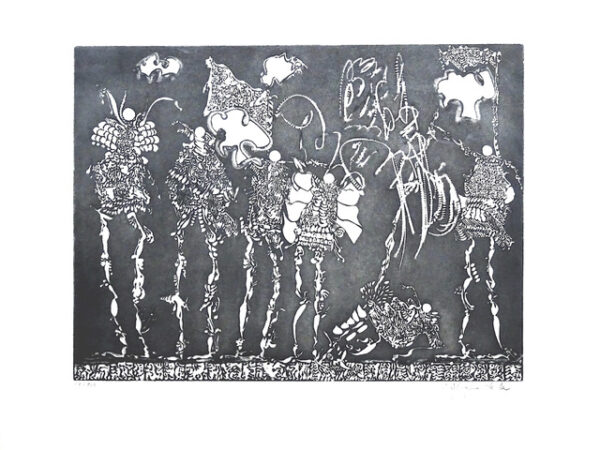
(Sans titre)
Jacques Spacagna Eau forte(65 X 50 cm) sur Arches signé et daté 1970/72 en bas à droite et numéroté 17/100 en bas à gauche. Jacques Spacagna (1936-1990) peintre et poète qui adhéra au mouvement lettriste de 1959 à 1972 et en fut l'un des principaux représentants à travers de nombreuses peintures de signes ou hypergraphies- $451
- $451
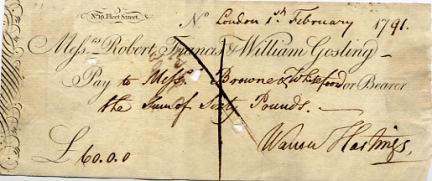
Cheque made out and signed by Hastings (in full ‘Warren Hastings’) to Messrs Browne & Whitefoord for £60.
HASTINGS, Warren (1732-1818). Drawn on Messrs Robert, Francis & William Gosling, London 1 February 1791. This cheque dates from the time of Hastings's trial for supposed irregularities during his governorship. The trial lasted intermittently for seven years (1788-1795) as and when parliamentary business allowed.- $220
- $220
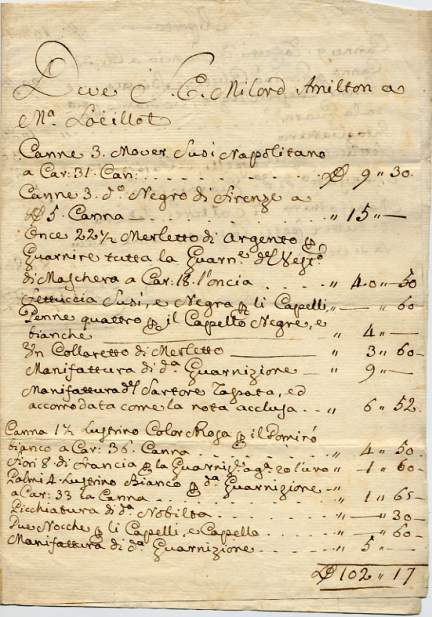
Collection of eight documents relating to Greville’s expenses, including two accounts specifically made out to Sir William Hamilton.
GREVILLE, Charles Francis (1749-1809). Further material relates to Hamilton's estate. Greville is particularly remembered for the 'gift' of his mistress, Emma Lyon (1765-1815) to his uncle William Hamilton, whose heir he had become, in 1786. The present collection largely relates to the domestic expenses of both Greville and Hamilton.21 June 1768, small slip: Account (in French) to Hamilton from Marie Loeillot for blue lustrine. 29 March 1790, 2 pages 4to: Account (in French) to Greville (in London) for providing and packing mirrors. 3 April 1790, 6 pages folio: lengthy account made out (in French) to Greville (in London) for furnishing number 73 Rue de La Verrerie in Paris, amounting to 9,929.2.6. livres. 7 April 1790 1 page 4to: letter to Greville from his agent in Paris, Perregaux, drawing his attention to the foregoing bill and also that previous one, for the mirrors. April? 1803: Invoice presumably to Greville from the London merchants, Kay & Prodgers for furnishings etc. including, 'Gowns & Bonnetts', 1 pages 4to rather tattered. This was long after Emma had been transferred to Hamilton. Greville remained unmarried although in search of a rich wife.8 May 1804: Receipt signed by William Crichton for £122 9s 4d 'from the Executor of the late Sir William Hamilton'8 October 1805: receipt signed by John Kay and Ed. Prodgers for £15 17s, 'the amount of our claim on the estate of the late Sir William Hamilton K.B. dece'd, for linen drapery, as proved by us in the court of Chancery in the cause Crichton against Greville .'. Small slip with embossed revenue stamp.Undated bill in Italian to 'Milord Amilton' on account of M. Loeillot for various furnishings.- $808
- $808
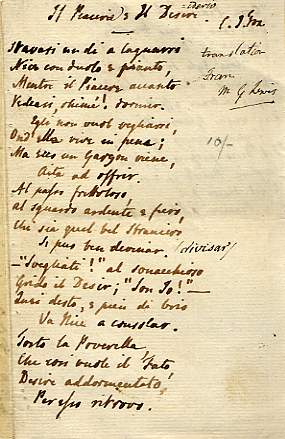
Autograph Manuscript of two poems in Italian, 3 pages 8vo, signed by Fox (‘C.J. Fox’) at the head of each. Remains of old mount on blank (fourth) side.
FOX, Charles James (1749-1806). The poems are La Gelosia [Jealosy], 24 lines, and 'Il piacere [pleasure] & Il Desire (corrected in another hand to 'Desiderio') [desire]. The hand which has corrected 'Il Desire' adds 'translation / From / M G Lewis', i.e. presumably Matthew Gregory ('Monk') Lewis (1775-1818), although the connection is unclear.- $1,102
- $1,102
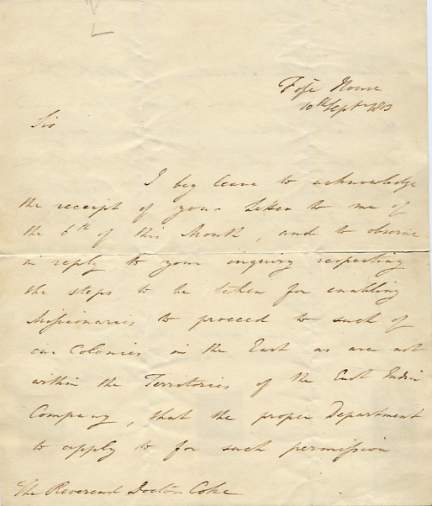
Letter Signed to the Rev. Dr Coke, 2 pages 4to (split in fold, some traces of old mounting), Fife House, 11 September 1813.
LIVERPOOL, R.B. Jenkinson, Second Earl of (1770-1828). Relating to the position of missionaries travelling to those parts of the colonies 'in the East' which were not in the territories of the East India Company.- $183
- $183
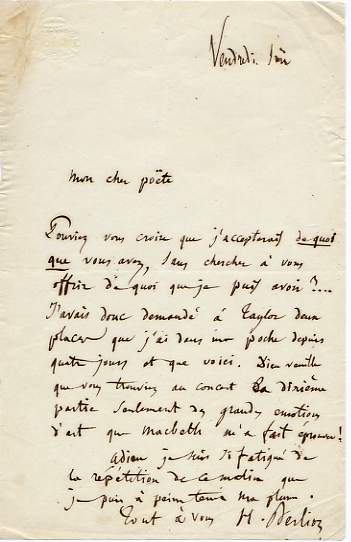
Autograph Letter Signed to Emile Deschamps, poet and author of the libretto of Roméo et Juliette, 1 page 8vo, Friday evening [27 October 1848].
BERLIOZ, Hector (1803-1869). 'Did you really believe I'd accept anything of yours without trying to offer you something of my own in return? . I asked Taylor for two seats, which I've been carrying around in my pocket for the past four days and I now enclose. I fervently hope this concert gives you even just one tenth of the great artistic emotion which Macbeth gave me! .'He is 'so exhuasted by this morning's rehearsal that I can hardly hold the pen'.Deschamps' adaptation of Macbeth had been premiered on 2 October at the Odéon. The tickets Berlioz gave him would have been for his forthcoming concert on 29 October at the opera house in Versailles.Correspondance Générale 1233.- $1,249
- $1,249
![Charming Autograph Letter Signed ('Albert') to the Sub[-Dean of Windsor]](https://rarebookinsider.com/wp-content/uploads/2023/11/30940979544.jpg)
Charming Autograph Letter Signed (‘Albert’) to the Sub[-Dean of Windsor], written at the age of 8, 2 pages 8vo in pencil (browned), York Cottage, 15 January 1904.
GEORGE VI (1895-1952). The future King George VI, known as Albert until his accession, was born at York Cottage, Sandringham, Norfolk, on 14 December 1895. This is one of his earliest-known letters. '.Thank you very much for the post-card that you sent me. I hope you are quite well. We are enjoying ourselves very much here.Good luck / your sincere friend / Albert.'- $661
- $661
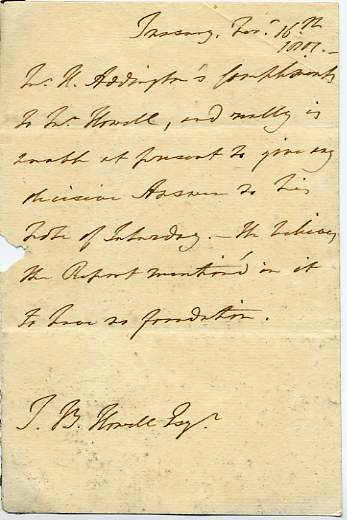
Autograph Letter (third person) to J.B. Howell, 1 page 8vo (traces of mounting and a small tear not affecting the text), Treasury 16 ?November 1801.
ADDINGTON, Henry, 1st Viscount Sidmouth (1757-1844). 'Mr. H. Addington's compliments to Mr. Howell, and really is unable at present to give any decisive Answer to his note of Saturday. He believing the Report mention'd in it to have no foundation.'- $124
- $124
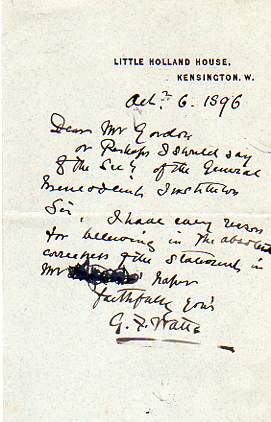
Autograph Letter Signed to Mr Gordon, 1 page 8vo, Little Holland House, 6 October 1896.
WATTS, George Frederic (1817-1904). Declaring that he has 'every reason for believing in the absolute correctness of the statements in Mr (name scribbled out) paper'. The writing paper carries the printed address of Little Holland House although it was knocked down in 1875. He subsequently moved to New Little Holland House in Melbury Road, backing on to his good friend Frederic Leighton's property.- $220
- $220
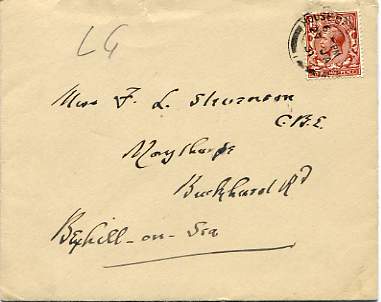
Autograph envelope addressed to ‘Miss F.L. Stevenson CBE’, postmarked 27 January 1931.
LLOYD-GEORGE, David, 1st Earl (1863-1945). Frances Louise Stevenson, later Countess Lloyd-George of Dwyvor (1888-1972) was hired by David Lloyd George in 1911 to be the governess of his daughter Megan. She became his secretary and mistress in 1913 and was to marry him in 1943. Their correspondence (My Darling Pussy: The Letters of Lloyd George and Frances Stevenson, ed. A.J.P. Taylor was published in 1975.- $110
- $110
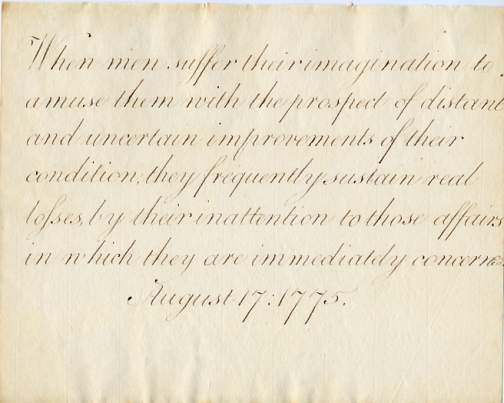
Autograph page from schoolboy writing book (unsigned), 1 page 4to (oblong), 17 August 1775.
WILLIAM IV (1765-1837). A six-line sentiment, in English in a fine copperplate hand. Lines from The Country Maid and her Milk Pail'When men suffer their imagination to amuse them with the prospect of distant and uncertain improvements of their condition, they frequently sustain real losses, by their inattention to those affairs in which they are immediately concerned.'- $330
- $330
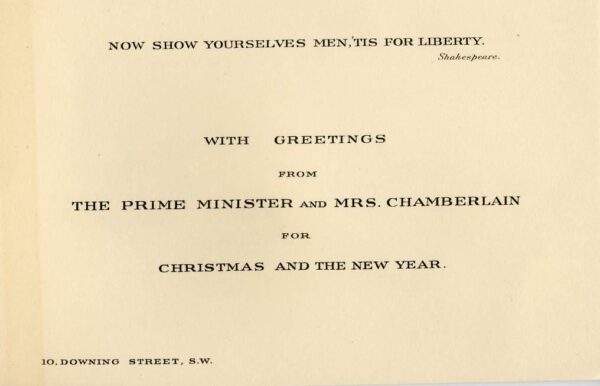
Chamberlain’s Christmas Card for 1939, unsigned, but a remarkable relic of what must have been his most difficult Christmas, 110 x 175mm. (4½ x 7 inches).
CHAMBERLAIN, (Arthur) Neville (1869-1940). The card is embossed in gilt on the front 'Christmas 1939' and is adorned with a red ribbon. Neville Chamberlain had become prime minister on 28 May 1937 at a time when the policy of appeasement was already established by the Foreign Office. He was a strong advocate of British rearmament, especially of the air force, for which purpose he raised the rate of taxation in the 1937 budget. The sequence of events leading to the outbreak of war with German on 3 September 1939 is well known to history. Anthony Eden and Winston Churchill now returned to the government and Chamberlain, although unhappy with his role as a war leader, became firmly opposed to any kind of rapprochement with Hitler without there being an end to Nazi policy.Christmas 1939 could hardly have been a happy time for Chamberlain. The strange quietness engendered by the so-called 'phoney war' came to an end on 10 May 1940 with Hitler's invasion of France. On that day Chamberlain resigned and Churchill became prime minister.1939 was Chamberlain's last Christmas. Soon after his resignation he became aware of symptoms of the abdominal problem which was confirmed as the cancer from which he was to die on 9 November 1940.- $183
- $183
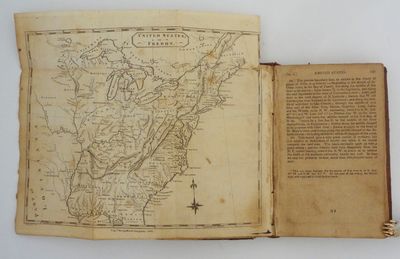
General Geography and Rudiments of Useful Knowledge
Spafford, Horatio Gates Hudson, 1809 First edition. Full calf. 8vo. [xii] 381pp with 2 fold out maps and diagram of the solar system. Pages toned with some foxing. Covers and spine show wear. The second fold out map "engd. for Spafford's geography 1808" by Gideon Fairman Sr. is titled "United States; or Fredon." "It was a great oversight" of the Constitution's framers that they did not give the United States a "proper name." So claimed Samuel Latham Mitchill in an 1803 broadside. A doctor by training, Mitchill not only diagnosed this problem, he also proposed a remedy. The land occupied by the United States, he suggested, should be called Fredon, or Fredonia in its more "poetical" form. The people of Fredonia would be called Fredonians or Fredes. And the adjectival form would be Fredish. Mitchill declared these various words were "sonorous," and the whole language "rich and copious." This Fredish language would even translate well into verse: "Their chiefs, to glory lead on/The noble sons of Fredon."- $200
- $200
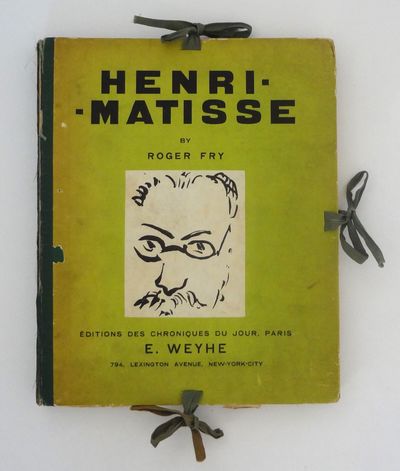
Henri Matisse
Fry, Roger Paris, 1931 First edition limited to 650 copies of which this one is not numbered. Quarto. Glassine covered soft wraps in ribbon tied hard cover. 50 pages of text in English with illustrations interspersed and 40 b/w plates and 4 full color plates. Binding intact but loose. Spine creased with small loss. Hard cover shows some wear with a little fading and back hinge starting.- $1,500
- $1,500
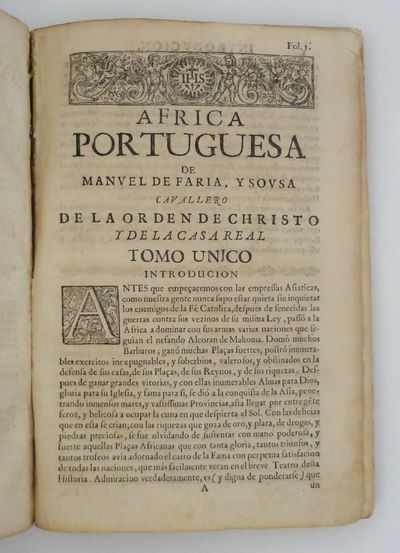
Africa Portuguesa
Faria y Sousa, Manuel De Lisbon, 1681 Folio in sixes. [iii], Title, Dedication and License; 207pp. Tabla 11pp. (Pages misnumbered, going from 86 to 89 but with continuous text). Text in Spanish. Contemporary vellum bound stiff wraps. Professionally rebound in original cover with some restoration to the first two sheets. Housed in custom cover and slipcase. A few small closed tears to page edges. Vellum cover a little age wrinkled with one tear to top of spine. Manuel de Faria y Sousa was a Portuguese historian and poet who frequently wrote in Spanish. The tone of some of his work which excited the suspicion of the inquisitors, caused his temporary incarceration, and led to the permanent loss of his official salary. In spite of the enthusiasm which is said to have prescribed to him the daily task of twelve folio pages, death overtook him before he had completed his greatest enterprise, a history of the Portuguese in all parts of the world. Several portions of the work appeared at Lisbon after his death, under the editorship of Captain Faria e Sousa : Europa Portugueza (1667, 3 vols.); Ásia Portugueza (1666–1675, 3 vols.); África Portugueza (1681). This account of the Portuguese possessions in Africa is a compilation, the scope of the volume extending from the year 495 to 1520. It gives a narrative of various expeditions along the coasts, and deals principally with North African Territories. (Mendelssohn Vol. 1 p.533).- $1,750
- $1,750
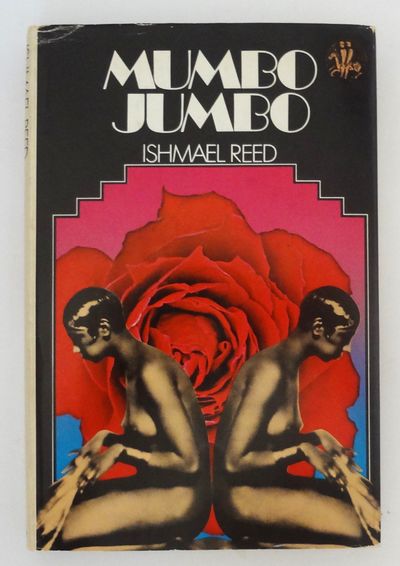
Mumbo Jumbo
Reed, Ishmael New York, 1972 First Edition. Hardcover. Octavo. 223pp. Black cloth over boards. Fine in a good price clipped dust jacket. Ishmael Scott Reed is an American poet, novelist, essayist, songwriter, playwright, editor and publisher known for his satirical works challenging American political culture. His best-known work is Mumbo Jumbo (1972), a sprawling and unorthodox novel set in 1920s New York. Reed's work has often sought to represent neglected African and African-American perspectives; his energy and advocacy have centered more broadly on neglected peoples and perspectives, irrespective of their cultural origins. - wikipedia.- $275
- $275
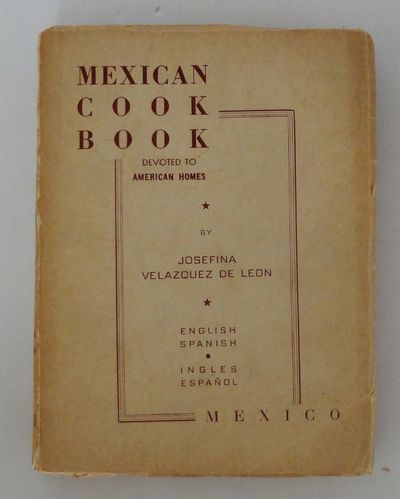
Mexican Cook Book Devoted to American Homes
Velazquez de Leon, Josefina Mexico City, 1947 First Edition. Soft cover 7 3/4" by 5 1/2". 363 pages. Written in two languages: English and Spanish translated by Concepcion Silva Garcia. Drawings by Guadalupe Muteozabal Velazquez de Leon. Pages tanned and some chipping to edges of cover. Two pages loose. Josefina Velazquez de Leon was an entrepreneurial author and teacher who traveled throughout the Mexican Republic holding cooking classes and collecting regional recipes and, in doing so, united Mexican cooking as one cuisine. In 1947, De Leon wrote the bilingual "Mexican Cook Book: Devoted to American Homes. Authentic Recipes from Every Region of the Mexican Republic," the first Mexican cookbook published in the United States, introducing the complexity of traditional Mexican cuisine (not Tex-Mex or Cal-Mex) to an American audience.- $250
- $250
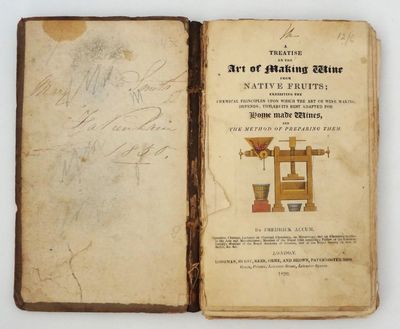
A Treatise on The Art of Making Wine From Native Fruits; Exhibiting The Chemical Principles Upon Which The Art Of Wine Making Depends; The Fruits Best Adapted For Home Made Wines And The Method Of Preparing Them
Accum, Fredrick London, 1820 Hard cover. Small octavo. Paper over boards. [viii] (9)-92pp, [xxiii] 1 pp. A 23 page prospectus of a new edition of "Accum's Treatise on Adulterations of Food and Culinary Poisons" at rear. Title page with color diagram of a wine press. Lacks front free end paper. Front hinge separating with some loose gatherings and one leaf torn near binding. From the preface "My principal intention in this Treatise has been to give a concise description of the art of preparing the several varieties of Wine which may be made from fruits of domestic growth, to enable those who possess no knowledge of the subject to proceed with facility and success." Gabler G6930. Accum was an extremely accomplished chemist, and member of the Royal Academy of sciences his publications were, in his own words,.."it has been my purpose to express all necessary rules and instructions in the plainest language, divested of those recondite terms of science, which would be out of place in a work intended for general perusal.- $400
- $400
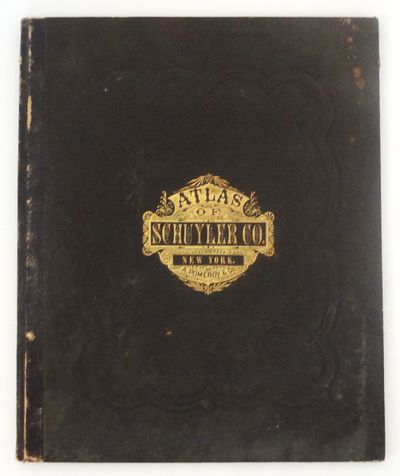
Atlas of Schuyler County New York
Philadelphia, 1874 Folio. Hard cover. Bound in quarter leather dark brown cloth covered boards, blind stamped and with a decoratively embossed title reading "Atlas Of Schuyler Co. New York. A. Pomeroy & Co." in gilt. 57 pages. Some rubbing to cover otherwise very good. Color maps, including four fold out, of Schuyler County showing prominent towns and cities, the county, a double page Plan of New York State and a double page Map of the United States and Territories. Preceded by an Index, Table of Distances, Population Chart and List of Post Offices.- $285
- $285
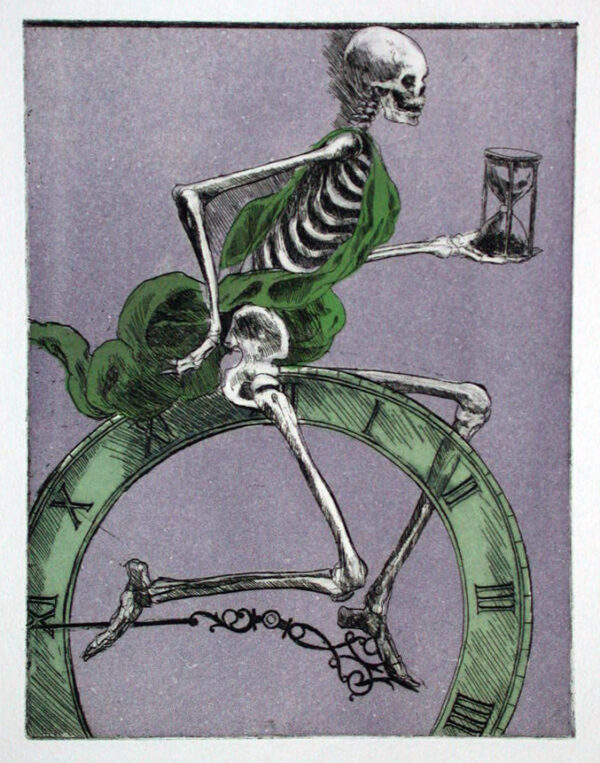
APOCALYPSE CLOCKS
Kuch, Michael A deluxe copy in 4 parts: the book, an extra suite of 13 signed etchings, original pastel of the sundial, and the original copperplate for the sundial. Folio (12 x 17). Twenty leaves including 3 black & white etchings and ten large color etchings are bracketed by two poems ("Harvest" and "Race") by Kuch. Bound by Shoshannah Wineburg in wood-veneer boards with a glass window revealing an etched clockface. That leaf, in turn, reveals the pendulum. With the third leaf we see the clock in its entirety. The book and the 3 portfolios are held in a black & red cloth tray case. A brilliant book, occasioned by the millennium. "Hourglass, sundial, gothic clock, pendulum, weights & wound spring combine with skeletal elements to produce detailed & arresting images of devices that portend the end of the world. Vibrant hues create a carnival atmosphere reminiscent of El Dia de los Muertos." No. 12 of 13 special copies, with the extra suite, pastel, & copper plate. Michael Kuch printed his etchings. Art Larson printed the letterpress text in 16 point van Dijck,- $8,050
- $8,050
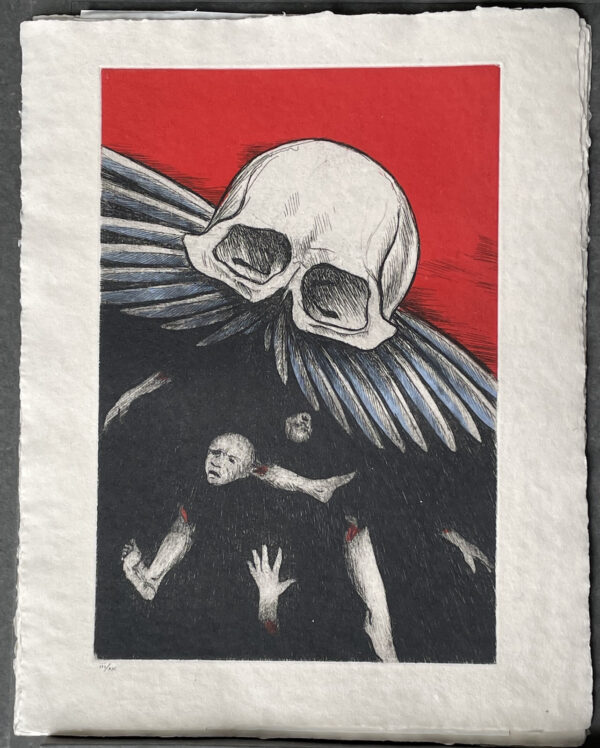
FALLING TO EARTH
Double Elephant Press. Kuch, Michael No. 3 of 6 "Making Copies" housed in 4 steel-walled cases. 11 1/2 x 15. *The book of 42 leaves: 14 poems printed letterpress and 21 etchings in color and b&w. Binding materials & colors suggest the former World Trade Towers. * The 14 poems written out by Kuch on handmade paper, signed. * Complete set of 21 preparatory monotypes, signed. * Complete set of dry points, signed. * Complete set of etched states, signed * Two original copperplates. One is the final etching in the book, "Vade in pace" -- 4 elephants saluting a departing parachute, with turtle in foregorund. * A watercolored sketch of this etching * A large, finished watercolor of the etching. Falling to Earth is an artist's and poet's reaction to the terrifying and tragic collapse of the World Trade Center Towers and to the ensuing bombing campaign. The book's imagery uses the metaphor of falling to look at the human and spiritual costs of violence. Mythological & biblical narratives are evoked in a modern framework that may give perspective to raw, recent events. Icaraus, Jacob's ladder, & parachuting Christs descend in our new millennium. The poems and etchings are frequented by angels providing vantage from above. In Falling to Earth Michael Kuch "hopes to unfold a kind of topographical map of healing." The edition is 100 copies (with 10 hors commerce). Text and binding papers were made in New York by Carriage House Papers and Dieu Donné Papermill; text printed by Art Larson in 14 point Emerson. Bound by Shoshannah Wineburg and Barry Spence.- $6,900
- $6,900
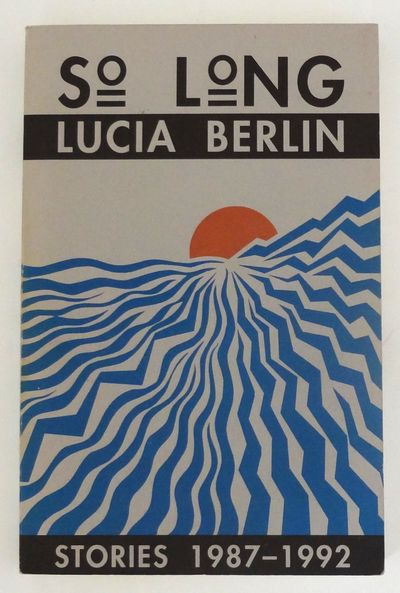
So Long
Berlin, Lucia Santa Rosa, 1993 Soft cover. Octavo. SIGNED by author with a personal inscription to Keith Abbott. Slight fading to spine otherwise very good. Poet and author Keith Kumasen Abbott was a colleague of Berlin's at Naropa University where he taught writing and art. He is perhaps best remembered for his memoir of Richard Brautigan, with whom he was a friend.- $550
- $550
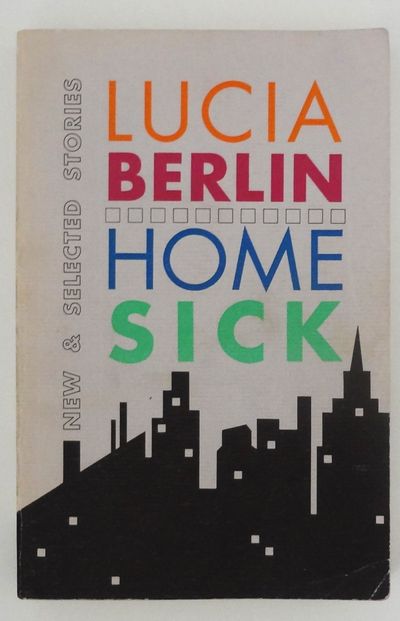
Home Sick
Berlin, Lucia Santa Rosa, 1990 Soft cover. Octavo. SIGNED by author with a personal inscription to Keith Abbott. Fading to spine otherwise very good. Poet and author Keith Kumasen Abbott was a colleague of Berlin's at Naropa University where he taught writing and art. He is perhaps best remembered for his memoir of Richard Brautigan, with whom he was a friend.- $650
- $650
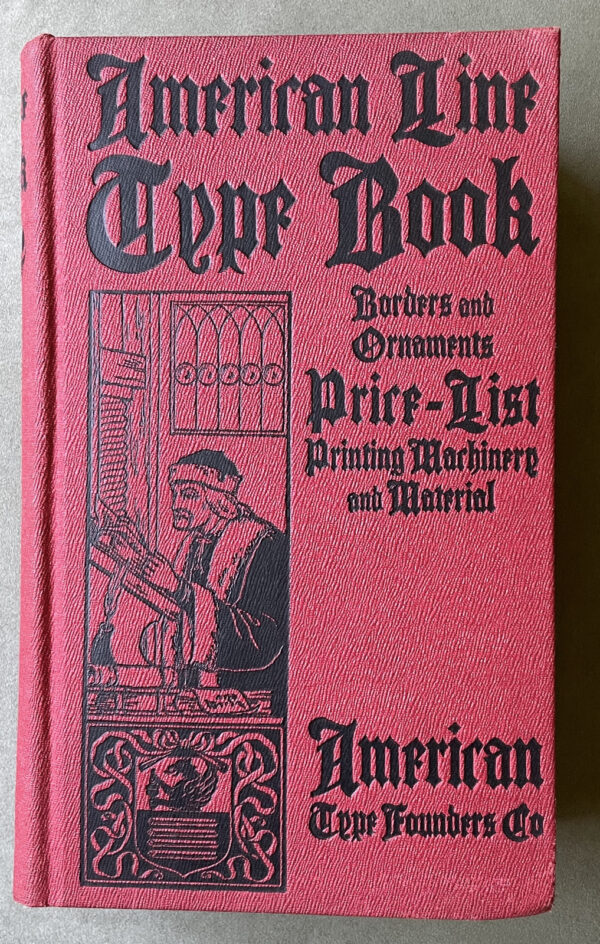
American Line Type Book
American Type Founders Co 6 x 10. xxx, 1181 pages plus 34 subscripted pages; with four pagination gaps as issued. Tipped in errata. Laid in are 2 order forms. Collated complete. Red cloth printed in black.A beautiful, fine copy. Extensive specimen with large sections of border and decorative material (about a third of the specimen) with much "arts & Crafts" material (Bradley, Hapgood, Roycroft). With wood type and printing equipment. According to Annenberg, there were 4 versions of this specimen, differing only in the brass rule section.- $575
- $575

Autograph Letter Signed – “We have arrived in the beautiful country of Italy!”
ALS of the notable German pianist-composer, then based in Paris to Carlo Severini, stage director of the Parisian Thêatre Italian, in Bologna. In French. Turin, June 10, [18]37. 2 pp. Bifolium (address on p. 4). In full: "We have arrived in the beautiful country of Italy! The poor weather that ruled for a long time, combined with some important business, delayed our trip by a month. We expect to stay here for two days to listen to some operas, and then we will move on to Milan. If you, by chance, find an opportunity to engage Mlle. Francilla for Lurques [?] or Pisa in the course of the summer, we would appreciate that very much. The season of the other [Italian] states, such as Reggio [Emilia] and Padua are already over or will close soon, it is not worth the effort. â" In any case, I have the courage to hope for a response due to your kindness, and I will immediately go to the post office when I arrive in Milan. Francilla and I ask you to accept our most distinguished feelings, and to remember us to Monsieur Rossini that we are looking forward to a reunion in the near future and with you as well. Your devoted servant J. P. Pixis." Francilla Pixis, born Franziska Helma Gà hringer (1816-1888), Pixis's foster daughter, was then a rising star among opera singers (mezzo soprano); she also studied with Henriette Sontag and Fernando Paër. Small hole to first leaf; piece of outer edge of of integral address leaf cut off, overall fine. 7.75 x 4.75 inches (19.7 x 12 cm).- $316
- $316

Autograph Letter about early productions of Rienzi and Tannhäuser
Important autograph letter signed ('Richard Wagner') to [the composer and conductor] Wilhelm Taubert (1811-1891), musical director of the Berlin Royal Opera, Dresden, December 11, 1847, 3 pages, 4to. With the attached integral address leaf and the remnant of the original red wax seal. Minor paper restoration to the seal tear, overall very fine. With a transcription and translation. A richly detailed letter by the 34-year old Wagner about early productions of Rienzi in Berlin and Tannhäuser in Dresden. Translated in full:"Due to a report from a lady friend I have heard of a performance of my Rienzi on the 3rd of this month. I have been assured by the report that despite the audience being so cold, the singers and especially the conductor wouldn't be diverted in the least from their enthusiasm and for this reason the entire performance turned out to be an excellent one. Both are said never to have worked so well before. I implore you to please give my best regards to the dear singers who are said to have shown so much affection for the performance that evening, despite the lifelessness of the audience. Their faithful acclamations at the Berlin synagogue that I have forfeited. If i am not mistaken, the performance I am talking about took place at the insistence of the king, whom I had asked to protect my interests. If there is anything more that can be done for the opera, it might be in having it performed once more on a Sunday. As far as I know Herr von Küstner has given his friend Lachner the advantage of Sundays, in full awareness and with great indefatigability. As my opera has never been performed on a Sunday, Herr Küstner ought to consider my request right and fair. After having denounced him to the king, so to speak, I cannot very well approach him personally. Neither can i so quickly request another order for his manager from the king, can I? Accordingly, I only have recourse to you and the worthy singers of my opera. Perhaps you could, as mediator, manage to succeed in having Rienzi performed on one of the following Sundays. Do look and see what you can do. Moreover, I am not worrying much about the absence of success in Brandenburg. I have too much respect for Berlin to recite her the reason for my calmness. By comparison, the prosperity of our opera in Dresden gives me ever increasing joy: it was a lovely revenge for me to present a splendid performance of Tannhäuser here to your king recently. He was very impressed and he told me, among other things, that he would not demand a performance of this opera in Berlin from me, under the present circumstances. (Naive enough!!). How is your gullible colleague Palestrina? I meant to say Nikolai? Is he still frequenting the royal table, supplying clerical conspiracies? Many blame him for the Prussian diplomatic note to Switzerland -- I cannot believe that his influence also goes as far as to the cabinet. If you see him, don't give him my regards. Concerning our concerts, I think I can manage now; soon you will hear something about it. By the way, nothing could have been more beneficial to me than the gossip which seemed so idle to me then, and which really annoyed me and harassed me in Berlin.: You know, regarding my imaginary engagement in Bern. My manager cannot be talked out of the idea that upon returning to Dresden, I had vigorously torn myself away from a great temptation in Berlin. He treats me with utmost gratitude and praises my loyalty. You see, how well the Swiss can provide for a person. It is really very funny! Well, my dear Taubert, let me hear from you sometime -- that will please me very much. Receive again my sincere thanks for your friendship, and the services you have rendered me. Please give me an opportunity to reciprocate. My wife sends you her kindest regards. Farewell, and remember me in good humor."Wagner's financial circumstances did not greatly improve, even after the 1844 publication of his first three opera scores (Rienzi, the Flying Dutchman- $9,775
- $9,775
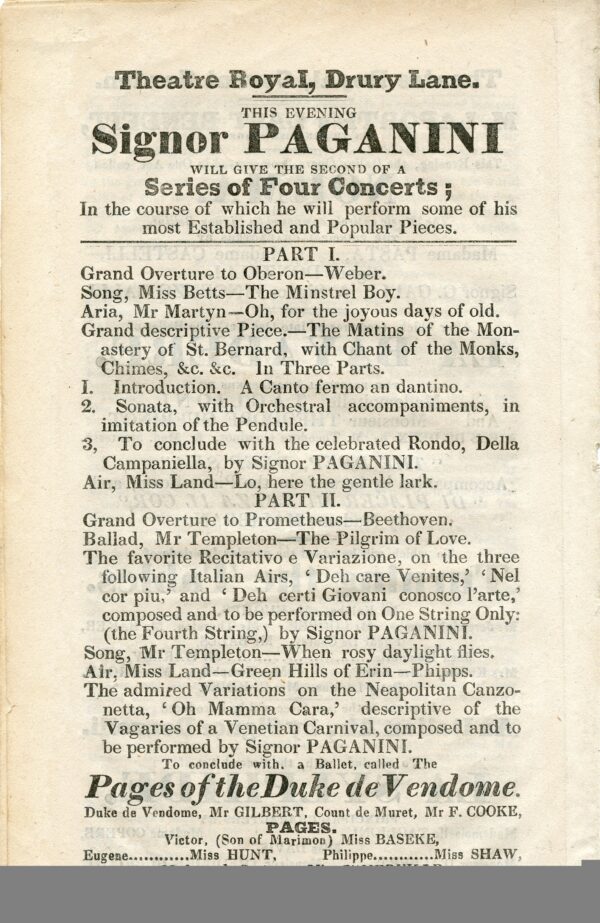
1833 London Concert Advertisement
Issue no. 3610 of The Theatrical Observer; And Daily Bills of the Play, a daily periodical published in London. Dated Friday, July 12, 1833. 4 pp. The final page consists of a large advertisement for a concert at Drury Lane with the header, "This evening / Signor PAGANINI / Will give the second of a Series of Four Concerts; In the course of which he will perform some of this most Established and Popular Pieces." The program includes The Matins of the Monastery of St. Bernard. Among other contents of the publication, a review of a performance of Bellini's La sonnambula with Maria Malibran as Amina at Covent Garden stands out (p. 1): "Her performance was marked by all that is beautifully impassioned in acting, combined with the most touching musical expression, and the most brilliant execution; she was, come a l'ordinaire, rapturously and vehemently applauded."8.25 x 5.25 inches (21 x 13.5 cm). Upper edge slightly frayed; small hole to head of second leaf covered with tape. Otherwise, in very good condition.The legendary Italian violinist, violist, guitarist and composer Paganini, embodiment of early nineteenth-century virtuosity and as such a model not only for other violinists but also for Franz Liszt, traveled to London four times between 1831 and 1834. The concert advertised here belongs to his third journey. Maria Malibran, nà e GarcÃa, from the famous GarcÃa dynasty, was one of the most celebrated opera singers of her time.- $1,725
- $1,725
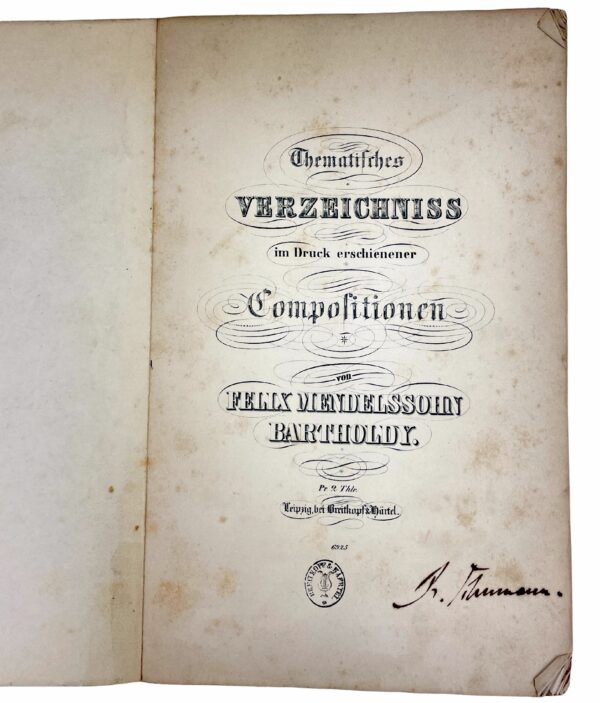
Thematisches Verzeichniss im Druck erschienener Compositionen von Felix Mendelssohn Bartholdy” – THE COPY OF ROBERT SCHUMANN
8vo. Title (vb); 1-61 pp [compositions with Opus number 1-100]; 63-64 pp [half-title]; 65 - 69 pp ["Compositionen ohne Angabe einer Opuszahl"]; 70p. ["Büsten, Medaillen, Portrais und sonstige Abbildungen"]; 71-73 pp. ["Systematisch geornetes Verzeichnis"]; 73 - 81 pp. [Verzeichniss.Gesangwerken gehà rigen Texte."]; 81-83 pp ["Lieder und Gesänge"]; 84 p. ["Dedicationen"]. Cover and title lithographed, otherwise engraved throughout. [PN] 6925. Title signed "R. Schumann" in ink to the lower right corner. Covers somewhat toned, lower right cover corner torn and lower right corners well thumbed through page 35. A few unopened leaves towards the end, scattered foxing throughout, else fine. A historic copy of the Mendelssohn Thematic Index, owned and signed on the title page by Robert Schumann, who regarded Mendelssohn as the greatest of his contemporaries. This is the second printing of the first edition which was prepared with the assistance of Mendelssohn himself in 1846, and is identical but for the change of price (1 Thlr changed to 2 Thlr). Reference: R. Elvers, Felix Mendelssohn Bartholdy. Briefe an deutsche Verleger (Berlin, 1968), p. 354."When it came to his contemporaries, Schumann reserved his highest praise for Mendelssohn, whose string quartets.counted among the few recent efforts worthy of late Beethoven. As indicated in a long diary entry of October 1842, Schumann was heartened by his colleague's warm praise for his own newly composed quartets.'for Mendelssohn is a formidable critic; of all living musicians, he has the sharpest eye.' Schumann's dedication of the quartets 'to his friend Felix Mendelssohn-Bartholdy with heartfelt respect' may thus be taken as an outward sign of his deep admiration for a composer whose approbation he avidly sought." (John Daverio, "Robert Schumann," p. 253)- $9,775
- $9,775
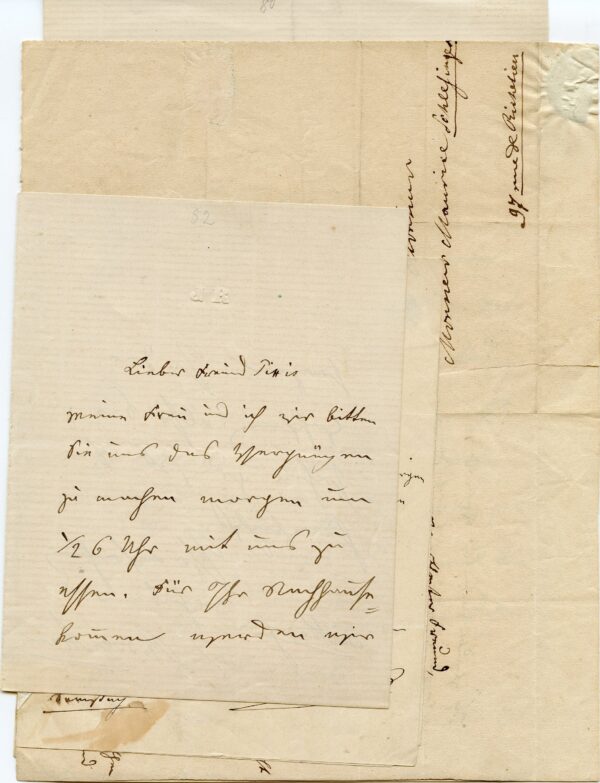
Six Autograph Letters Signed
An intriguing collection of letters from the German Jewish pianist and composer, who lived in Paris from 1837 to 1870. 1. To German composer and pianist Johann Peter Pixis. In German. 2 pp. Small bifolium with blind stamped monogram "JR." Dated "Wednesday." "Dear friend Pixis, my wife and I ask you to please us by having dinner with us tomorrow at half past five. We will take care of your return home." 5.25 x 4 inches (13.3 x 10.5 cm).2. To Johann Peter Pixis. In German. 1 p. Small bifolium. Dated "Saturday." "Friend Pixis, I ask you to please us by having dinner with us tomorrow Sunday at three. You must agree to make us really happy." 5.5 x 4.25 inches (13.6 x 11 cm).3. To the publisher Maurice Schlesinger (1798-1871). In German. 2 pp. Small bifolium. Dated "Wednesday." Address to final page, establishing the recipient, who is not mentioned in the letter itself. "Most worthy friend, I prefer to turn to you in writing rather than discuss my cause orally once more. I set the price of my etudes for two reasons, which does not allow me to depart from it even more. 1) Because they have been written for a publisher [i.e. Schlesinger] with whom I desire very much to enter a permanent business relationship. 2) Because they are for a man whom I hold in high esteem and who is very kind. Therefore I believed I would have to demand less from you than I would have demanded from anybody else, but I must insist on the price of 800 francs. Be so kind to answer within a few days. I will not offer my etudes to anybody else until then." 3.75 x 6 inches (15.5 x 9.8 cm).4. To unidentified male recipient. In German. 2 pp. Bifolium. Dated "Wednesday evening." "Rest assured that I thought of you quite often, but I did not come because I was not able to. I was a prisoner to my bed and home for three months. Now I am doing better. I took a few coach rides, weather permitting, but I haven't taken any walks so far. Thus I cannot hope to get permission to visit you as soon as I would like to." 8.25 x 5.25 inches (21 x 13.5 cm). 5. To "Monsieur Anders". In German. 2 pp. Bifolium. Dated "Wednesday." Address, "Monsieur Monsieur Anders en ville [Paris]," to final page. "I don't know how I can apologize to you. I am so extremely sorry for letting you wait in vain. I had more things to do than I thought, and thus it happened that I completely forgot about my meeting with you. Only today [.] people reminded you of it." The recipient could be the German painter Friedrich August Anders (1826-after 1856), who lived in Paris in the 1850s and probably after as well. 8 x 5.25 inches (20.2 x 13.5 cm).6. To unidentified recipient (probably a diplomat). In French. 3 pp. Bifolium with blind stamped monogram "JR." Baden (Grand Duchy) [now Baden-Baden], August 12, 1865. "A bit more than two months ago I received a letter from Madrid (copy attached) from the Ministry of the State telling me that Her Majesty the Queen [of Spain] has bestowed the order of Isabella the Catholic on me. I have not received either the diploma or the insignia ever since. I would be very much obliged to you, Monsieur, if you were so kind as to complain on my behalf and let the French ambassador in Madrid intervene. I think you are in a business relationship with him." The aforementioned copy of the letter from Madrid, on a single leaf of the same paper, is attached. It is in Spanish, dated June 4, 1865, and signed "A. Benavide." 7.75 x 5 inches (19.8 x 12.5 cm).Rosenhain began his career in Frankfurt, and then moved to Paris in 1837 by way of London. In Paris (where he remained for over thirty years), he became a prominent figure in the musical scene, particularly through his chamber-music evenings, attended by Cherubini, Rossini and Berlioz. During his over eighty-year life, Rosenhain composed in many genres, including four operas, an oratorio and three symphonies. He also wrote many other orchestral and chamber pieces, and a plethora of works for solo piano, including variations based on famous- $1,380
- $1,380
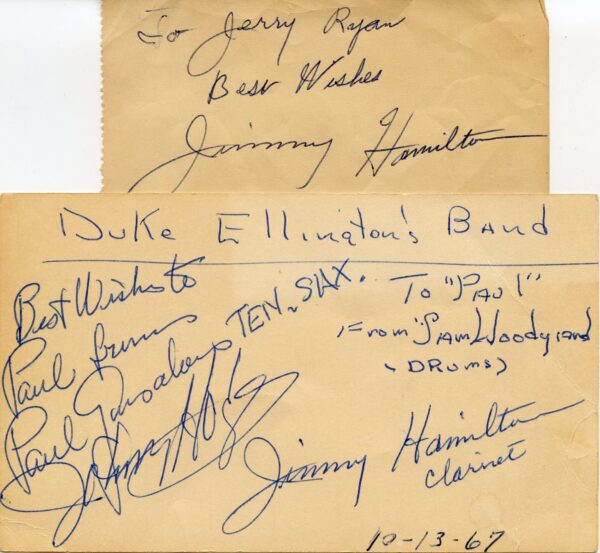
Set of 1967 Autographs from Duke Ellington’s Band
[Duke Ellington Band] Hamilton, Jimmy. (1917-1884) & Woodyard, Sam. (1925-1988) & Gonsalves, Paul. (1920-1974) & Hodges, Johnny. (1907-1970) A set of 5 autographs from the Duke Ellington band on two small pieces of paper, one dated 10/13 1967, the first signed from clarinetist Jimmy Hamilton and inscribed "To Jerry Ryan, Best Wishes"; the second identified "Duke Ellington's Band" in an unknown hand and signed with "Best wishes to Paul from Paul Gonsalves Ten. Sax," "Johnny Hodges," "To 'Paul from Sam Woodyard (Drums)" and "Jimmy Hamilton, Clarinet." 5 x 3 inches; 3.75 x 2.8 inches. Toned, else fine.- $288
- $288
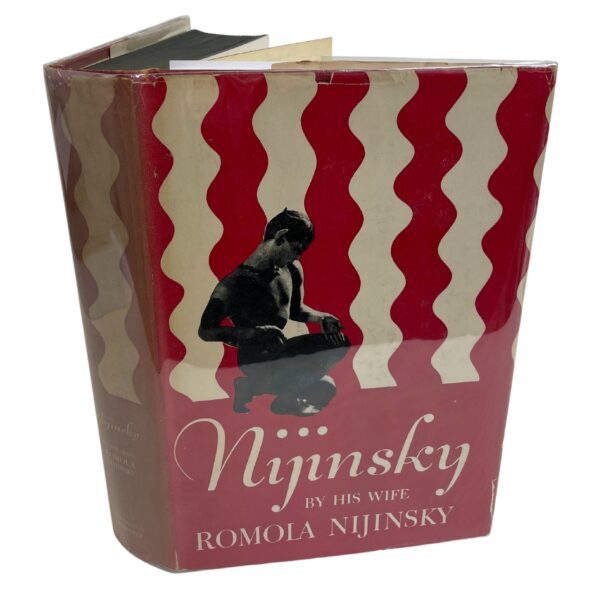
Nijinsky: By Romola Nijinsky, His Wife” – SIGNED
[Nijinsky, Waslaw. (1889-1950)] Nijinsky, NEE de Pulszky, Romola. (1891 - 1978) 8vo. 447 pp.17 photograph illustrations, index. Hardcover, red cloth in illustrated dustjacket, signed and inscribed by Romola Nijinsky on the first free endpage in blue ink: "To Marguerite Mc Bride / who is so wonderful + helpful / with my best wishes / Romola Nijinsky / 1952. New -York." Binding tight and very fine, a few pages with light corner creases, scarce dj with sunned spine and tears to edges, overall very good condition.An attractive signed copy of this controversial book, signed by the Hungarian heiress and dancer in Diaghilev's corps de ballet who won the affections of Vaslav Nijinsky on the company's 1913 sea voyage to South America, and by the time they landed in Buenos Aires, had convinced him to marry her! Upon receiving the news of the marriage, Diaghilev cabled Nijinsky to inform him that he was dismissed from the company. Severed from his personal and professional ties with the ballet, Nijinsky began his famous struggle with mental illness. Though he rejoined Diaghilev for a world tour, he retired in 1917 when he was diagnosed a paranoid schizophrenic.- $431
- $431
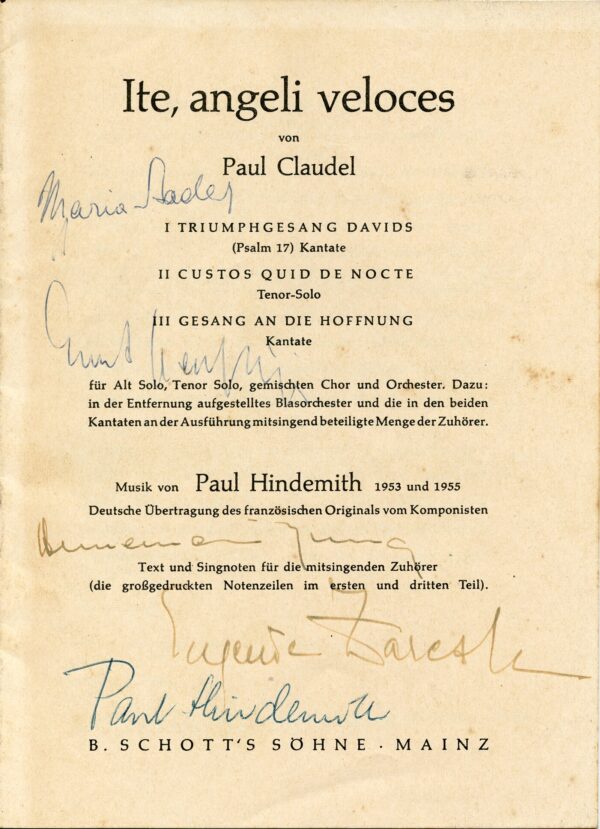
Ite, angeli veloces” – Signed Partbook
Hindemith, Paul. (1895-1963) Upright duodecimo. Staple-bound. Ite, angeli veloces von Paul Claudel. für Alt-Solo, Tenor-Solo, gemischten Chorus und Rochester. Dazu: in der Entfernung aufgestellten Blasorchester und die . an der Ausführung mitsingend beteiligte Menge der Zuhà rer. Text und Singnoten für die mitsingenden Zuhà rer (Text and partbook for the audience to join in). Mainz: B. Schott's Sà hne, 1955. 16 pp. German text only (translated by the composer). 7.5 x 5.5 inches (18.8 x 13.6 cm). Signatures of the composer, Maria Stader (1911-1999; Swiss soprano), Annemarie Jung (soprano), Ernst Haefliger (Swiss tenor, 1919-2007) and Eugenia Zareska (Polish mezzo soprano, 1910-1979) to first page. In fine condition.The musicians signing this copy participated in a performance of the work at the Lucerne Festival in 1956. See The Musical Times, October 1956, p. 546. The audience is supposed to sing the turba choruses, for which the present partbook was created. It includes the entire text of the work, the vocal parts for the audience, and cue notes leading up to the entrances. However, the parts intended for the audience are quite demanding, and even if the audience is led by professional "ringers," the success is questionable. In any case, this integration of the audience makes Ite, angeli veloces notable. As the composer explains in an extended note on p. 2, he created this work in collaboration with Claudel (1868-1955), and he regrets that Claudel died before its first performance.- $345
- $345
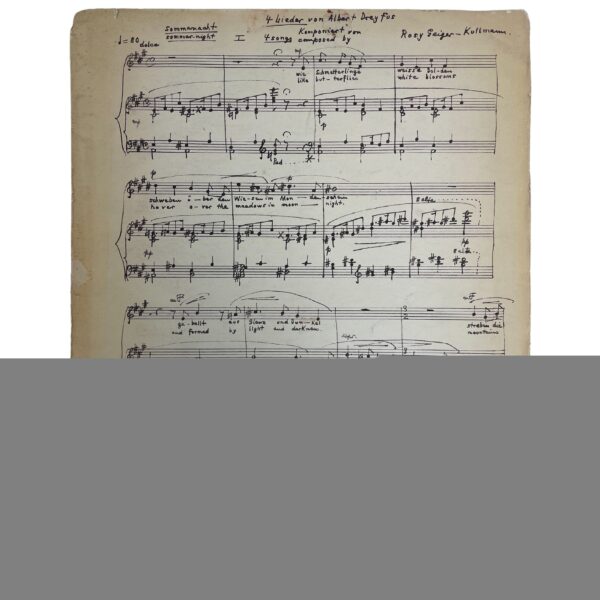
Two collections of songs for voice and piano – SIGNED
Geiger-Kullmann, Rosy. (1886-1964) Two facsimile autograph musical manuscripts, the first inscribed by the composer. As follows:5 Lieder nach Gedichten von Max Wertheim. For voice and piano. 10 pp. Maestro No. 105 music paper by Independent Music Publishers, New York, 12 staves to both sides. Bound in gray wrappers, with title to upper wrapper. Text in German and English. Inscription to unknown person to fol. 1r, "Aus den Blüten zieht ein Frieden in das schwergeprüfte Herz. Einen herzlichen Gruà von Ihrer Rosy Geiger-Kullmann." This is a quotation from the text of the first of the songs. 14 x 11 inches (35 x 28 cm). Significant staining along outer edge of the title page and to the wrapper, also frayed to outer edges. Small tears to pages of music, else very good. 4 Lieder von Albert Dreyfus. For voice and piano. Musical autograph. 10 pp. Maestro No. 105 music paper by Independent Music Publishers, New York, 12 staves but to one side only, glued back-to back. No wrappers/cover sheet; titling to head of first page of music. Text in German and English. 14 x 11 inches (35 x 28 cm). Minor stains and tears.5 Lieder nach Gedichten von Max Wertheim. For voice and piano. 10 pp. Maestro No. 105 music paper by Independent Music Publishers, New York, 12 staves to both sides. Bound in gray wrappers, with title to upper wrapper. Text in German and English. Inscription to unknown person to fol. 1r, "Aus den Blüten zieht ein Frieden in das schwergeprüfte Herz. Einen herzlichen Gruà von Ihrer Rosy Geiger-Kullmann." This is a quotation from the text of the first of the songs. 14 x 11 inches (35 x 28 cm). Wrappers frayed to outer edges. Small tears to pages of music.Rosy Geiger-Kullmann, nà e Dreyfuss, daughter of a Jewish family in Frankfurt, composed prolifically in a traditional idiom. Her most important teacher and champion before 1933 was the conductor Carl Schuricht. She emigrated from Germany in 1939 and settled in New York City in the following year. She spent her final years with her daughter in Monterey, CA. The two present sets of songs were composed in 1946 and 1947. The composer dedicated another copy of the Wertheim songs to her son, Herman Geiger-Torel (1907-1976), who co-founded the Canadian Opera Company in Toronto and directed it for many years, on the occasion of his 40th birthday (July 13, 1947). See https://www.lexm.uni-hamburg.de/object/lexm_lexmperson_00001241 (in German). No further information is available about the authors of the texts.- $173
- $173
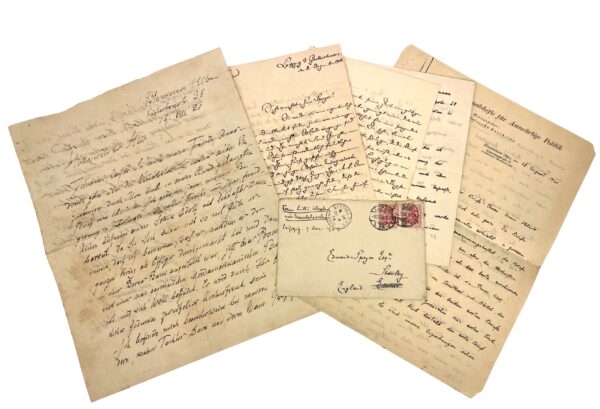
Collection of 4 Autograph Letters from the Mendelssohn Family to Edward Speyer
[Mendelssohn-Bartholdy, Felix. (1809â"1847)] An intriguing collection of 4 autograph letters signed from the composer's daughter, son-in-law, and grandson, all in German, and addressed to Edward Speyer. As follows:1. Lili Wach, nà e Mendelssohn Bartholdy (1845-1910), the composer's youngest daughter, to Edward Speyer in Shenley, England. Leipzig, December 8, 1908. 6 pp. 2 bifolia. With autograph envelope. Lili Wach writes at length about her youngest son Adolf jr., who was enrolled at Oxford University as an undergraduate, lived with the Speyers for a while, and now wants to embark on a business career, which is at odds with the Mendelssohn family tradition; at the same time, he would like to visit England again. She asks Speyer whether he could recommend her son to a business in London for an appointment. 7 x 5.5 inches (18 x 13.8 cm).2. Adolf Wach (1843-1926), the composer's son-in-law and husband of Lili Wach, to Edward Speyer, Blankenese [now Hamburg], August 16, 1921. 2 pp. 1 leaf. Wach writes from the home of his daughter Dora (Dorothea), who is married to her cousin Albrecht Mendelssohn Bartholdy (1874-1936). He again thanks Speyer for his support for the Wachs' youngest son, Adolf jr., while the latter was in England. Adolf sr. reports that his son was an officer in the First World War, then worked for a bank in Berne and now is general manager at a newly founded North American bank. Upper edge unevenly torn; small hole in the center. 11 x 8.5 inches (28 x 22 cm).3. Albrecht Mendelssohn Bartholdy (1874-1936), a grandson of the composer, to Edward Speyer. Blankenese [now Hamburg], August 28, 1921. 2 pp. 1 leaf. Stationary with letterhead of Hamburgische Monatshefte für Auswärtige Politik (Hamburg Monthly for Foreign Policy), a journal edited by Albrecht Mendelssohn Bartholdy. "I happily fulfill your request for manuscript copies of your father's [Wilhelm Speyer] letter to my grandfather [Felix Mendelssohn Bartholdy]. Like any writings received by my grandfather, these letter were bound in large folio volumes still under his supervision, which means that I cannot send you the letters themselves." In turn, Albrecht Mendelssohn Bartholdy asks Speyer for a manuscript copy of a letter in Speyer's possession from Mendelssohn's great-grandmother Elisabeth Wilhelmine Jeanrenaud (1796â"1871) that Speyer has mentioned before. Again, Albrecht Mendelssohn Bartholdy thanks Speyer for taking care of his brother-in-law Adolf Wach jr. "He works here in Hamburg, where the Mercantile Bank of the Americas maintains a major branch." 11 x 8.5 inches (28 x 22 cm).4. Albrecht Mendelssohn Bartholdy to Edward Speyer. Blankenese [now Hamburg], November 14, 1921. 2 pp. Bifolium. In full: "Dear Mr. Speyer, my sister-in-law in Leipzig [Lili Wach], whom I just met at a conference of the "Society of Friends" and questioned about the descendants of [Moritz] Hauptmann, thinks that a letter to Miss Helene Hauptmann, Salomonstrasse, Leipzig, would surely reach Hauptmann's daughter, who owns his archives. Miss Hauptmann also has a residence on the countryside, but the Leipzig address is safer. Whit the most devout regards Yours, Albrecht Mendelssohn Bartholdy." 6 x 7.5 inches (19 x 15 cm).Edward Speyer (1839â"1934) and his wife Antonia (nà e Kufferath, 1857â"1939) cultivated a center of musical life in their family estate of Ridgehurst in Hertfordshire, north of London, in 1894. Their circle included Carl Mozart, Rossini, Spohr, Mendelssohn, Liszt, Brahms, Joachim, Clara Schumann, and Elgar. Moritz Hauptmann (1792-1868) was a music theorist and composer. Felix Mendelssohn Bartholdy successfully recommended him as Kantor to St. Thomas Church in Leipzig in 1842, a position Hauptmann held until his death. From 1843 he also taught theory at Mendelssohn's conservatory in Leipzig, and in 1850 he was a founder member of the Bach-Gesellschaft as well as its first president. As to Mendelssohn's grandson Adolf Wach jr., we have been unable to confirm his life dates.- $1,380
- $1,380
